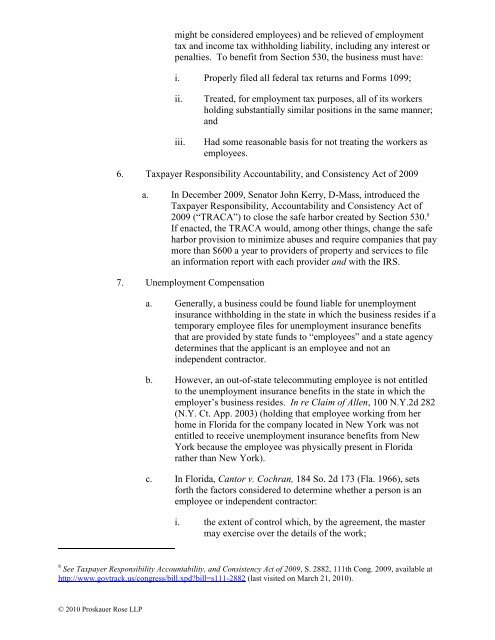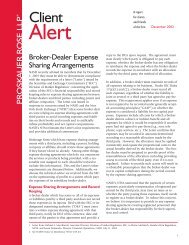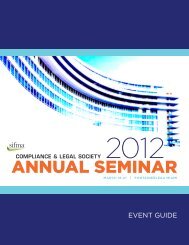Misclassification of Workers - Proskauer Rose LLP
Misclassification of Workers - Proskauer Rose LLP
Misclassification of Workers - Proskauer Rose LLP
Create successful ePaper yourself
Turn your PDF publications into a flip-book with our unique Google optimized e-Paper software.
© 2010 <strong>Proskauer</strong> <strong>Rose</strong> <strong>LLP</strong><br />
might be considered employees) and be relieved <strong>of</strong> employment<br />
tax and income tax withholding liability, including any interest or<br />
penalties. To benefit from Section 530, the business must have:<br />
i. Properly filed all federal tax returns and Forms 1099;<br />
ii. Treated, for employment tax purposes, all <strong>of</strong> its workers<br />
holding substantially similar positions in the same manner;<br />
and<br />
iii. Had some reasonable basis for not treating the workers as<br />
employees.<br />
6. Taxpayer Responsibility Accountability, and Consistency Act <strong>of</strong> 2009<br />
a. In December 2009, Senator John Kerry, D-Mass, introduced the<br />
Taxpayer Responsibility, Accountability and Consistency Act <strong>of</strong><br />
2009 (“TRACA”) to close the safe harbor created by Section 530. 8<br />
If enacted, the TRACA would, among other things, change the safe<br />
harbor provision to minimize abuses and require companies that pay<br />
more than $600 a year to providers <strong>of</strong> property and services to file<br />
an information report with each provider and with the IRS.<br />
7. Unemployment Compensation<br />
a. Generally, a business could be found liable for unemployment<br />
insurance withholding in the state in which the business resides if a<br />
temporary employee files for unemployment insurance benefits<br />
that are provided by state funds to “employees” and a state agency<br />
determines that the applicant is an employee and not an<br />
independent contractor.<br />
b. However, an out-<strong>of</strong>-state telecommuting employee is not entitled<br />
to the unemployment insurance benefits in the state in which the<br />
employer’s business resides. In re Claim <strong>of</strong> Allen, 100 N.Y.2d 282<br />
(N.Y. Ct. App. 2003) (holding that employee working from her<br />
home in Florida for the company located in New York was not<br />
entitled to receive unemployment insurance benefits from New<br />
York because the employee was physically present in Florida<br />
rather than New York).<br />
c. In Florida, Cantor v. Cochran, 184 So. 2d 173 (Fla. 1966), sets<br />
forth the factors considered to determine whether a person is an<br />
employee or independent contractor:<br />
i. the extent <strong>of</strong> control which, by the agreement, the master<br />
may exercise over the details <strong>of</strong> the work;<br />
8 See Taxpayer Responsibility Accountability, and Consistency Act <strong>of</strong> 2009, S. 2882, 111th Cong. 2009, available at<br />
http://www.govtrack.us/congress/bill.xpd?bill=s111-2882 (last visited on March 21, 2010).




